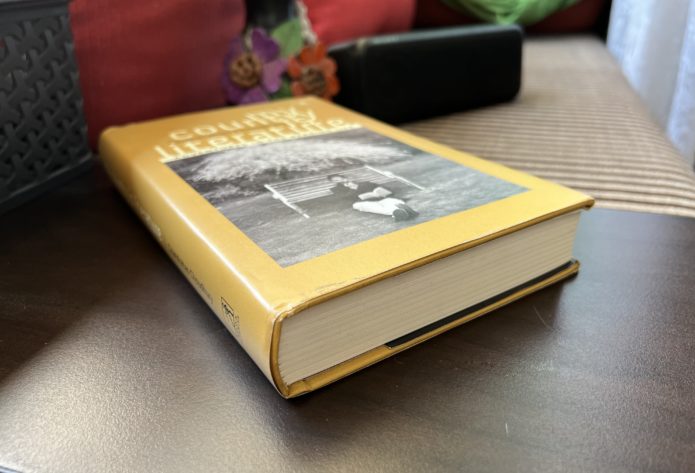Last month a dear friend gifted me a book. A physical one. With smells, sounds and good old paper. It has pages that I can dog-ear. And write my notes. Circle. Underline. Etc. And so, have revisited the pleasures of reading a physical book. It has done wonders to my reading.
It didn’t quite start that way. When I unwrapped the gift to see books, the first thought was, where do I keep them? Skirmishes at home about my books and the space they occupy have been persistent. Peace has been wrought by sticking to the kindle. Until these books arrived.
So, I left these books on a side table. I had to figure out how to get back to caressing a book while devouring what it held. Perhaps in the hesitating was a fear of falling in love with the physical book again.
One of the books seemed to tug at me. Chandrahas Choudhury’s “My Country Is Literature”.
The back cover had this.
“A book is only one text, but it is many books. It is a different book for each of its readers. My Anna Kareninais not your Anna Karenina; your A House for Mr Biswas is not the one on my shelf. When we think of a favourite book, we recall not only the shape of the story, the characters who touched our hearts, the rhythm and texture of the sentences. We recall our own circumstances when we read it: where we bought it (and for how much), what kind of joy or solace it provided, how scenes from the story began to intermingle with scenes from our life, how it roused us to anger or indignation or allowed us to make our peace with some great private discord. This is the second life of the book: its life in our life.”
Those lines were enough to shed my romance and dive into experiencing the sensuous pleasures that only a book can kindle. Sorry about the stupid pun.
Anyway, I have read been devouring with great relish. This book is a collection of literary criticisms on the works of an esoteric set of writers. Perumal Murugan. Orhan Pamuk. Sadat Hasan Manto. Nehru. Junichiro Tanizaki. Manu Joseph. And several others.
I have been slow reading. Rereading. Fast reading. Beginning all over again. There is no bar at the bottom of the page that tells me I have finished 43% of the book. The volume of fresh pages on my right palm are inviting by their weight and crisp edges. So I go slow.
A Library Of Emotions For The Pleasures Of Reading
In the middle of all this, another dear friend sent this message on whatsapp.
“I think Emerson wrote somewhere that a library is a kind of magic cavern which is full of dead men. And those dead men can be reborn, can be brought to life when you open their pages.
Speaking about Bishop Berkeley (who, may I remind you, was a prophet of the greatness of America), I remember he wrote that the taste of the apple is neither in the apple itself—the apple cannot taste it- self—nor in the mouth of the eater. It requires a contact between them.
The same thing happens to a book or to a collection of books, to a library. For what is a book in itself? A book is a physical object in a world of physical objects. It is a set of dead symbols. And then the right reader comes along, and the words—or rather the poetry behind the words, for the words themselves are mere symbols—spring to life, and we have a resurrection of the word.”
Borges, Jorge Luis, from his book This craft of verse
My mind right now is like a meadow sprouting all kinds of green after a luxurious spell of afternoon rain. And as dusk falls, birds and insects chirp away. Strange calls and uncommon sounds seem to festoon the night ahead as I look at the pages ahead. A strange set of emotions that are beyond the stuff in the common library of emotions.
That’s what reading a book does to me. How I love “what have you been reading lately?” to bibliophiles like Manu!
The many pleasures of reading are best left unexplained. For explanation does it more harm than good. I can say that with certainty after writing all this.


